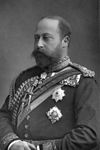Portal:University of Oxford/Selected biography/24
Edward VII (1841–1910) was King of the United Kingdom and the British Dominions and Emperor of India from 22 January 1901 until his death on 6 May 1910. He was the first British monarch of the House of Saxe-Coburg and Gotha, later renamed the House of Windsor. His education included studies at Christ Church, Oxford and Trinity College, Cambridge. Before his accession to the throne, Edward held the title of Prince of Wales and was heir apparent to the throne for longer than anyone else in history. During the long widowhood of his mother, Queen Victoria, he was largely excluded from political power and came to personify the fashionable, leisured elite. The Edwardian period of his reign, named after him, heralded significant changes in technology and society, including powered flight and the rise of socialism and the Labour movement. He fostered good relations between Great Britain and other European countries, especially France, for which he was popularly called "Peacemaker", but his relationship with his nephew, Wilhelm II of Germany, was poor. Edward presciently suspected that Wilhelm would precipitate a war, and four years after Edward's death, World War I brought an end to the Edwardian way of life. (more...)

